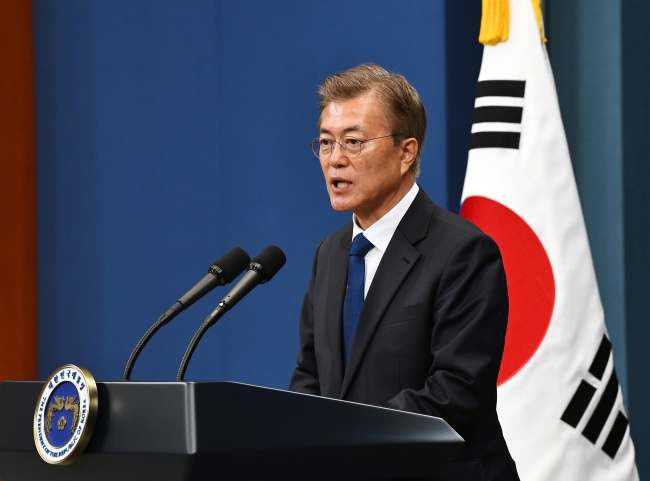President Moon Jae-in has accepted the resignation of the chief prosecutor, a presidential spokesman said Friday.
"President Moon, this afternoon, accepted Prosecutor-General Kim Soo-nam's resignation," Moon's chief press secretary Yoon Young-chan said at a press briefing, adding the resignation will be effective as of Monday.
 |
(Yonhap) |
The three-day pause was apparently aimed at affording him enough time for a departure ceremony.
Yoon said the president had agonized over Kim's resignation. He had seven months left in his two-year tenure.
"But in the face of an unprecedented impeachment of a president and the launch of a new government following an early election, the president decided to respect Prosecutor-General Kim's decision to resign so as not to place any burden on the new government," the presidential official said.
Still, the president's decision to let Kim go may have been encouraged by his ongoing efforts to reform the prosecution, which he apparently holds at least partly responsible for the corruption scandal that removed his conservative predecessor Park Geun-hye from office.
On Thursday, the new president ordered his new senior presidential secretary for civil affairs to get to the bottom of many corruption allegations surrounding the ousted president, apparently suggesting a possible failure, if not wrongdoing, by the prosecution in its earlier probe on such allegations.
Moon had been widely expected to replace many top government officials appointed by the ousted former president, but after he had found adequate replacements.
Prior to Kim, the new president had only accepted the resignation of two ranking government officials appointed by his conservative predecessor.
Former Prime Minister Hwang Kyo-ahn, who had also served as the acting president since Park's parliamentary impeachment late last year, offered to step down Thursday. This came after the president announced his nominee for the new prime minister, Lee Nak-yon.
Park Sung-choon also stepped down as the minister of patriots and veterans affairs Thursday.
He had widely been blamed for refusing to reinstate a pro-democracy song at an annual ceremony marking the 1980 democratic uprising in Gwangju, 350 kilometers south of Seoul, which left hundreds of people killed and thousands of others injured.
Moon signed an executive order earlier in the day, making the song, "March for the Beloved," an official part of the ceremony, according to Cheong Wa Dae. (Yonhap)





![[Exclusive] Hyundai Mobis eyes closer ties with BYD](http://res.heraldm.com/phpwas/restmb_idxmake.php?idx=644&simg=/content/image/2024/11/25/20241125050044_0.jpg)
![[Herald Review] 'Gangnam B-Side' combines social realism with masterful suspense, performance](http://res.heraldm.com/phpwas/restmb_idxmake.php?idx=644&simg=/content/image/2024/11/25/20241125050072_0.jpg)

